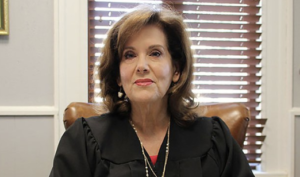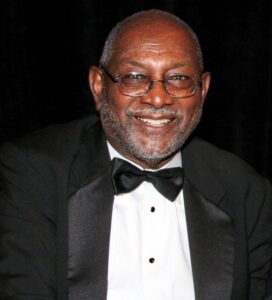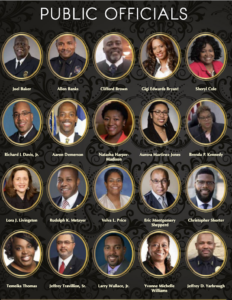
Jacqueline Habersham takes over the Texas Commission on Judicial Conduct at a tumultuous time. But while acknowledging problems and highlighting solutions, she says she’s up for the task.
Jacqueline Habersham has officially assumed leadership of the Texas agency that disciplines unethical judges and is promising to put the agency’s public image back on the right track, while working to reduce staff turnover.
The Texas State Commission on Judicial Conduct announced Wednesday that it appointed Habersham as its executive director after a national and local job search. Habersham, who’s worked as a lawyer at the commission for nearly 19 years, most recently served as its interim executive director.Current commission chair David Hall said in a statement that Habersham showed her ability during her stint as interim director.
“I am personally excited by Ms. Habersham’s intrinsic understanding of the commission’s operations and her integrity in all matters,” said Hall. “The thirteen volunteer commissioners rely upon our executive director to manage the daily duties and the powers of the Commission.”
Last year, the agency lost two commissioners, its chairwoman, and then-executive director Eric Vinson.
The turnover came as the commission was handling a controversial case against Pct. 1 Place 1 Judge Dianne Hensley. The judge conducted heterosexual marriage ceremonies, but cited her Christian religious beliefs while referring same-sex couples to other wedding officiants. The commission sanctioned her violating rules that require impartiality from judges. Hensley has since sued the commission over its public warning against her.
“It’s no secret we’ve had some turnover for various reasons,” said Habersham, who now will assume permanent leadership over the agency’s 13 staff members, including a general counsel and four staff attorneys who handle ethical cases against judges. “I think the commission … will continue to do good work. I want to foster a better relationship with the general public.”
The commission has attracted public controversy and negative headlines, after losing the commissioners and executive director because of the same-sex marriage case involving Hensley.
Amy Suhl was one of two commissioners appointed by Gov. Greg Abbott in the summer of 2018, who saw their appointments withdrawn before the Texas Senate could confirm them. She said the Hensley case was to blame for her appointment withdrawal.
In February 2019, Suhl and another governor-appointed commissioner, Maricela Alvarado, were called to two separate meetings at the governor’s office. Suhl said her meeting made her uncomfortable. She said she got the impression that the governor’s staffers knew how she planned to vote in the Hensley case.
Suhl’s personal view is that refusing to marry same-sex couples is no different than in the past, when religious beliefs were brought up to refuse interracial couples’ marriages, she said.
When she and Alvarado learned their appointments were withdrawn later that spring, Suhl said she heard it was because Abbott wanted appointees to serve the governor, not themselves.
“The governor’s office was trying to only put people on [the commission] that they thought would do the stuff the way they wanted,” she said. “The commission is not supposed to be political. It’s supposed to be an avenue to ensure judges are performing ethically.”
Just after the commission in August 2019 held an informal proceeding over the Hensley sanction, its then-executive director Eric Vinson submitted his resignation from the job. Then-Chairwoman Catherine Wylie resigned after Vinson’s departure.
No one from the governor’s press office immediately returned a call or email seeking comment.
Habersham, the new executive director, is stepping into the turmoil left in the wake of the Hensley case.
She’s also assumed the temporary role of defending her commission and its commissioners from the lawsuit that Hensley filed over her sanction, alleging the group violated Hensley’s religious freedom rights under Texas law.
So far, Habersham has represented the defendants in the case, but she won’t stay in that role for long.
“The Attorney General’s Office has declined to represent the commission,” she said. “At this time, the commission is in the process of finalizing the retention of outside counsel.”
There have also been other disruptions.
Habersham noted that three of the agency’s six attorneys are newly hired to replace lawyers who left to follow other job opportunities.
She has one goal to ask the Texas Legislature for more funding to increase the salaries of existing staff attorneys to improve retention, and to hire more lawyers to handle an increasing workload of new complaints against judges.
“We have some very good people in the right places right now. Granted, a lot of our staff members are new. We are training them and getting them up to speed. They are very talented attorneys and investigators, and I just want to make this a good working environment,” she said.
Another of Habersham’s goals is to educate the public about the commission’s authority, the procedures it follows and why it does the things that it does.
Habersham acknowledged that she has big shoes to fill.
But she said, “I am up for the task.”
Commissioners fall as judge’s ethics case unfolds

Judge Dianne Hensley. Photo courtesy of FirstLiberty.org
Texas Lawyer reconstructed a timeline of events from the public file in the Judge Dianne Hensley case from records that Texas Lawyer obtained from the Texas Office of the Governor through open records requests, and interviews.
Summer 2017: The Waco Tribune published an article about Hensley’s practice of marrying heterosexual couples, but not homosexual couples, which the commission considered during Hensley’s case.
December 2018: The commission had already decided to sanction Hensley and released a tentative public warning to the judge.
February 2019: The governor’s office held two meetings with Gov. Greg Abbott’s appointed then-Commissioners Amy Suhl and Maricela Alvarado, among others. The governor appointed Suhl and Alvarado in 2018, but their appointments were subject to Senate approval in the 2019 legislative session. Two meeting notices that Texas Lawyer obtained from the governor’s office under the Texas Public Information Act shows the February meetings’ attendees included Governor’s Office general counsel Jeff Oldham, and deputy general counsels Angela Colmenero and James Sullivan, among other staffers. Later that spring, Abbott withdrew their appointments before the Texas Senate could confirm Suhl and Alvarado.
Aug. 8, 2019: Hensley appeared before the commission for an informal proceeding.
Aug. 13, 2019: Vinson submitted a letter of resignation as the commission’s executive director.
Aug. 30, 2019: Vinson works his last day. Sometime after Vinson’s departure, then-Chairwoman Catherine Wylie also resigned her position.
Nov. 12, 2019: Hensley received a public warning from the commission. The warning said she violated an ethical rule requiring her to conduct extra-judicial activities in a way that undermined her impartially based on a person’s sexual orientation, said the warning.
December 2019: Hensley filed a civil lawsuit that alleged that the agency and all of its commissioners violated her religious freedom rights by sanctioning her. The commission and commissioners have denied the allegations and argued they have immunity.
Habersham takes over the commission at a tumultuous time.
Courtesy law.com




